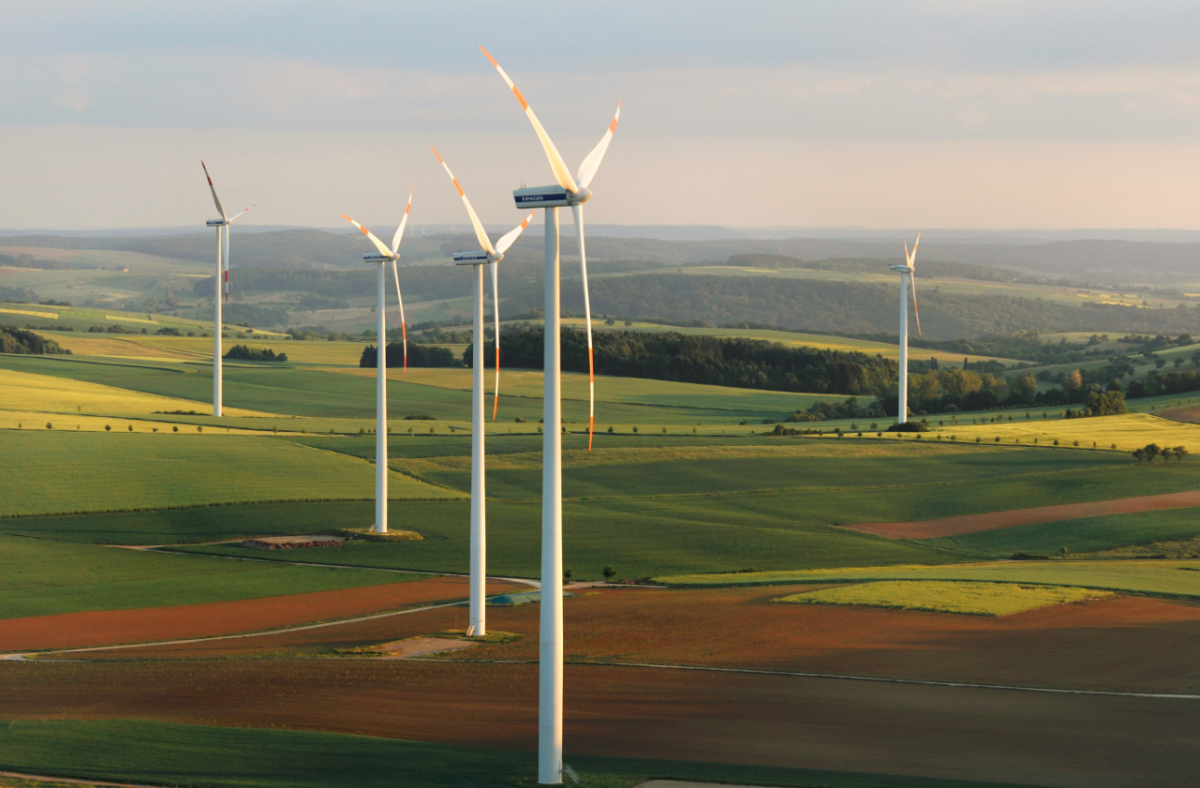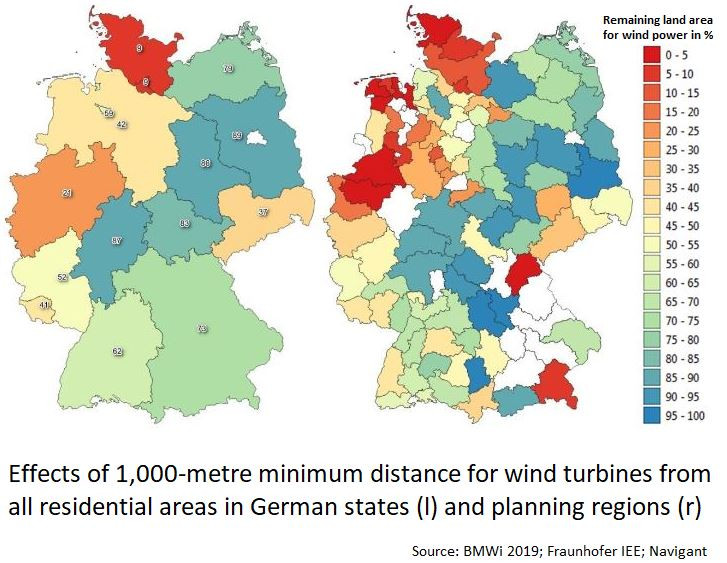Design of Germany's wind power distance rules undecided as opposition to policy grows
The German government has yet to decide details of the 1,000-meter minimum distance rule to keep new onshore wind turbines away from residential areas that was proposed by the country's so-called climate cabinet, economy and energy minister Peter Altmaier said in an interview with national radio broadcaster Deutschlandfunk. "Are we talking about settlements with 5 houses, with 10, with 7 or with 12? We haven’t decided on this yet," Altmaier said in reaction to harsh criticism of the proposed distance rule voiced by Germany's industry associations, labour unions and environmental NGOs alike.
The exact definition of the wind power regulation, which is contained in a draft legislative package on Germany's coal exit, would determine how much the land area available for wind turbines is going to shrink depending on the number of houses that form a "village-like structure." According to a study on the consequences of minimum distance on wind power commissioned by Altmaier's economy and energy ministry (BMWi), strict rules could reduce the potential area for expansion in the country by up to 40 percent.
The expansion of wind power threatens to grind to a halt with the planned introduction of distance rules, writes the Federal Environment Agency (UBA) based on a new study. "The federal government's goal of installing around 67 to 71 gigawatts (GW) of onshore wind power capacity by 2030 is only theoretically achievable with the currently designated areas," writes UBA. Expansion on these areas is "subject to considerable uncertainties" such as concerns of species protection, air traffic control and lack of economic efficiency, especially due to inadequate wind conditions, says the study. Germany needed more, not less, land area to securely reach its goal of covering 65 percent of power consumption with renewables by 2030, says UBA.
The minister invited wind power industry representatives on 18 November to discuss the rapid decline in onshore wind power expansion levels and said the talks had been very “factual". He rejected the idea that conditions for onshore wind power in the country had worsened with the proposals from the climate cabinet. "They had already started over the past few years, when we still hadn't debated minimum distances at all."
Critics of Altmaier's wind power proposals, which include influential heavy industry association BDI, labour union group DGB and wind power association BWE said it was “incomprehensible” that the government was sticking to tight distance rules even though the country's 2030 energy and climate targets clearly could not be reached this way. Environmental group WWF warned that the distance rules could even deal a "fatal blow" to onshore wind power in Germany.
The expansion of onshore wind power, which is projected to become Germany's most important power source in a low-carbon energy system, has dropped to the lowest level in almost 20 years, with no more than 86 turbines added in the first half of 2019 compared to nearly 1,800 in the whole of 2017. Thousands of planned onshore wind projects in Germany are currently on hold and industry associations have warned that tens of thousands of jobs are on the line if the situation for manufacturers does not improve.
The announcement by Enercon, Germany’s most important turbine manufacturer, to slash about 3,000 jobs added further pressure on the economy minister to clarify the government's stance on wind power regulation. Stephan Weil, Social Democratic (SPD) premier of Lower Saxony, Germany's most important wind power state, said the entire wind power industry in the country was at risk due to "obstacle courses" created by policymakers. He announced that his state would not implement the 1,000-metre distance rule. The climate cabinet had decided to enable states to do so.
Conservative CDU "energy transition opponents" increase sway over economy ministry - media
Altmaier meanwhile stressed that over 1,000 citizen initiatives against wind power by now existed all over the country and that he needed to make sure that the transition to renewable energy sources succeeded despite opposition. In 2018, however, the government still stated that there was no indication that minimum distance rules lead to greater acceptance of wind power among citizens.
Altmaier said he would work to reduce licensing problems for new turbines, which are very often a result of legal interventions by national aviation authorities and the military, by streamlining laws in all federal states in order to relax radio communication safety regulations.
In a separate article in the Tageszeitung, Malte Kreutzfeldt said the new department head for energy policy in Altmaier's ministry, Stephanie von Ahlefeldt, stood behind a more restrictive approach to wind power. She previously worked for Altmaier's conservative CDU party colleague Carsten Linnemann, head of the influential pro-business wing of the CDU and a vocal critic of many energy transition policies. Ministry sources said von Ahlefeldt was acting as "the long arm of the CDU's energy transition opponents", which sought to achieve a "turnaround" in energy policy, Kreutzfeldt wrote. He added that Nikolai Ziegler, chairman of the large anti-wind power lobby group Vernunftkraft, worked in the economy ministry as an aide for digital policy. According to the article, Ziegler recently intensified his activities in energy policy within the ministry.
Meanwhile, Gerald Traufetter and Frank Dohmen reported in Der Spiegel that the CDU's pro-business wing "pushed" minister Altmaier into making von Ahlefeldt new head of energy policy in order to obstruct the country's coal exit and corresponding policies.
Citizen energy alliance calls for including people financially instead of blocking expansion
Germany's Renewable Energy Federation (BEE) and the national Alliance for Citizen Energy (BBEn) welcomed new wind power regulations that would do away with the right of citizen projects to take part in wind power auctions without first obtaining a construction permit. The practice has resulted in severe delays following auctions that are now partly to blame for the slump in expansion. "But just abandoning one wrong rule is not enough," the associations said. They are calling on the government to introduce "mechanisms for true participation" by citizens in future onshore wind power expansion.
René Mono of the BBEn said minimum distance rules were just a "smoke screen" for greater wind power acceptance and that improving opportunities for citizens to become more financially involved in projects could do much more in terms of helping people come to terms with the technology. "The government has to spark a bit of enthusiasm about the energy transition," he said.



